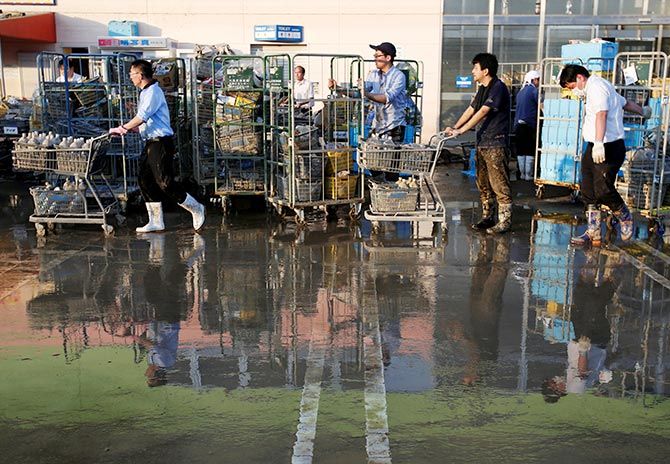While Mumbai struggles with heavy rains for the past four days, torrential rain in Japan, unleashed floods and landslides resulting in the deaths of almost 180 people.
Rescuers in Japan are racing to find survivors after the country witnessed the country’s worst weather disaster for 36 years.
Here are some incredible images showing the sheer devastation in western Japan.

Houses sit partially submerged in floodwater in Kurashiki, Okayama, Japan. At last count, the deaths were pegged at 179, but officials said that number could rise as rescuers were still searching under the debris of homes. The record downpour began last week and has left a trail of destruction in its path. Photograph: Tomohiro Ohsumi/Getty Images

A car stands on its front in an area affected by flooding in Kurashiki, Okayama, Japan. Rescue workers are going door-to-door, looking for survivors -- or victims -- of the disaster. The crisis is the deadliest rain-related disaster in over three decades, and has sparked national grief. Photograph: Tomohiro Ohsumi/Getty Images

Damaged houses are seen in an area affected by flooding in Kurashiki, Okayama, Japan. Several million people have been forced out of their homes. Hundreds of homes have been destroyed.. Photograph: Tomohiro Ohsumi/Getty Images

Soldiers push a boat as they prepare to search for survivors following heavy flooding. Around 75,000 police, firemen and troops have been deployed in the search and rescue operation across parts of central and western Japan. Photograph: Carl Court/Getty Images

Soldiers carry an elderly woman to a vehicle to be evacuated after rescuing her following heavy flooding in Kurashiki near Okayama, Japan. Thousands of people remain in shelters, and local authorities in some areas were offering drinking water and bathing services for those without their own supply. Photograph: Carl Court/Getty Images

A car stands on its front following heavy flooding. The country’s prime minister, Shinzo Abe, cancelled an overseas trip to oversee the emergency response to the disaster. Photograph: Carl Court/Getty Images

Survivors face health risks from high temperatures and a lack of water. Power has been restored to all but 3,500 homes, but more than 200,000 people remain without water under the scorching sun, with temperatures hitting 33C in some areas. Photograph: Issei Kato/Reuters

Employees of a supermarket push trolleys and shelves, with muddy items, at their store in a flooded area in Mabi town in Kurashiki, Okayama Prefecture. The government has set aside 70 billion yen (Rs 4,326 crore) in infrastructure funds with 350 billion yen (Rs 2.16 lakh crore) in reserve. Photograph: Issei Kato/Reuters

Submerged and destroyed houses and cars are seen in a flooded area in Mabi town. Swollen rivers burst their banks and bridges were washed away, while bullet train services have been suspended in most parts of western Japan. Photograph: Issei Kato/Reuters

A local resident walks in front of submerged and destroyed houses in a flooded area in Mabi town. Residents in Hiroshima said the situation was worse than the summer of 2014, when torrential rain triggered landslides that killed 77 people. Photograph: Issei Kato/Reuters

Even with the rains over, the risk of flooding remained, with the town of Fuchu in Hiroshima issuing a new evacuation order as a local river burst its banks. Photograph: Kyodo/Reuters

Flooding has engulfed entire villages, submerging streets up to roof level. In some places, just the top of traffic lights could be seen above the rising waters. Photograph: Kyodo/Reuters

The Japan Meteorological Agency said as much as 10 centimetres of rain per hour fell on large parts of south-western Japan. Photograph: Kyodo/Reuters

In some places, with the flooding making roads impassable, rescuers were using boats or helicopters to airlift those affected to safety. Photograph: Kyodo/Reuters

A new evacuation order went out on Tuesday in a part of Hiroshima prefecture, after a river blocked by debris overflowed its banks, affecting 23,000 people. Photograph: Issei Kato/Reuters















